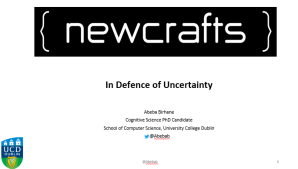 I gave a talk on the above title at NewCrafts Paris 2019 conference and was asked for bibliography underlying the content of my talk so here it is. I have included the abstract below to provide some context. I might also write a blog sometime in the future so watch this space. 🙂
I gave a talk on the above title at NewCrafts Paris 2019 conference and was asked for bibliography underlying the content of my talk so here it is. I have included the abstract below to provide some context. I might also write a blog sometime in the future so watch this space. 🙂
Abstract: Imagine a world where we are able to predict people’s behaviour with precision. A world, for example, where we can tell whether someone is going to a commit crime before they do. A lot of our problems would just disappear. The quest for absolute certainty has been at the top of Western science’s agenda. In a similar fashion, current technological developments tend to strive for generalizability and predictability. We value certainty, stability and uniformity. Whereas most of reality, instead of being orderly and stable is seething with change, disorder and process. People, far from being predictable and predetermined, are complex, social and dynamical beings that inherently exist in a web of relations. This talk discusses how absolute certainty is not only an unattainable goal so far as understanding people and the social world is concerned but also a dangerous state to aspire to.
In Defence of Uncertainty – Bibliography
- Amazon scraps secret AI recruiting tool that showed bias against women
- Angwin, J.; Larson, J.; Mattu, S.; and Ajunwa, I., Friedler, S., Scheidegger, C. E., & Venkatasubramanian, S. (2016). Hiring by algorithm: predicting and preventing disparate impact. Available at SSRN.
- Bakhtin, M. M. (2010). The dialogic imagination: Four essays (Vol. 1). University of texas Press.
- Bakhtin, M. M. (2010). The Dialogic Imagination: Four Essays. University of Texas Press.
- Barad, K. (2007). Meeting the universe halfway: Quantum physics and the entanglement of matter and meaning. duke university Press.
- Baumer, E. P., & Silberman, M. (2011, May). When the implication is not to design (technology). In Proceedings of the SIGCHI Conference on Human Factors in Computing Systems (pp. 2271-2274). ACM.
- Birhane A (2017) Descartes was wrong: “a person is a person through other persons” | Aeon Ideas.
- Descartes, R. (2013). René Descartes: Meditations on first philosophy: With selections from the objections and replies. Cambridge University Press.
- Ferryman, K., & Pitcan, M. (2018). Fairness in Precision Medicine. Data & Society.
- Foucault, M. (2002). The order of things: An archaeology of the human sciences. Psychology Press.
- Gonen, H., & Goldberg, Y. (2019). Lipstick on a Pig: Debiasing Methods Cover up Systematic Gender Biases in Word Embeddings But do not Remove Them. arXiv preprint arXiv:1903.03862.
- Google ‘genuinely sorry’ after app labels dark-skinned people as ‘gorillas’ | CBC News
- Holquist, M. (2003). Dialogism: Bakhtin and his world. Routledge.
- Introna, L. D., & Nissenbaum, H. (2000). Shaping the Web: Why the politics of search engines matters. The information society, 16(3), 169-185.
- Juarrero, A. (1999). Dynamics in action: Intentional behavior as a complex system (p. 127143). Cambridge, MA: MIT press.
- Marková, I. (2016). The dialogical mind: Common sense and ethics. Cambridge University Press.
- Maturana, H. R., & Poerksen, B. (2004). From being to doing. The origins of the biology of cognition.
- Mbiti, J. S. (1990). African religions & philosophy. Heinemann.
- Morson, G. S., & Emerson, C. (Eds.). (1989). Rethinking Bakhtin: extensions and challenges. Northwestern University Press.
- New Study Uses Machine Learning to Predict Sexual Orientation
- O’Neil, C. (2016) Weapons of Math Destruction: How Big Data Increases Inequality and Threatens Democracy.
- Online Etymology Dictionary – Root word of science
- Prigogine, I., & Stengers, I. (1985). Order out of Chaos.
- Richardson, R., Schultz, J., & Crawford, K. (2019). Dirty Data, Bad Predictions: How Civil Rights Violations Impact Police Data, Predictive Policing Systems, and Justice. New York University Law Review Online, Forthcoming.
- They’re watching, and they know a crime is about to take place before it happens
- Von Foerster, H. (2007). Understanding understanding: Essays on cybernetics and cognition. Springer Science & Business Media.
- Von Foerster, H., & Poerksen, B. (2002). Understanding systems: Conversations on epistemology and ethics (Vol. 17). Springer.
- Wang, Y., & Kosinski, M. (2018). Deep neural networks are more accurate than humans at detecting sexual orientation from facial images. Journal of personality and social psychology, 114(2), 246.
- Wilson, B., Hoffman, J., & Morgenstern, J. (2019). Predictive Inequity in Object Detection. arXiv preprint arXiv:1902.11097.